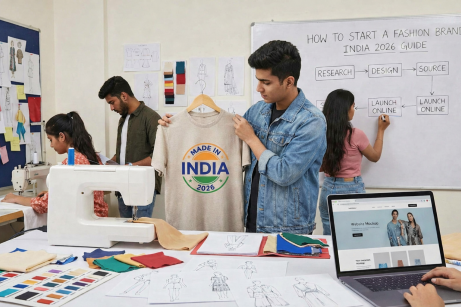.jpeg)
Digital fabrication is revolutionizing the design and manufacturing industries, offering unprecedented precision and efficiency. As this technology continues to evolve, the demand for skilled professionals in digital fabrication is rising. This article provides an overview of digital fabrication courses, covering what you need to know to excel in this cutting-edge field.

- What is Digital Fabrication?
- Core Components of Digital Fabrication
- Benefits of Digital Fabrication Courses
- Career Opportunities
- Highlight: Amor Design Institute
- Conclusion
- FAQs
1. What is Digital Fabrication?
- Definition and Scope
Digital fabrication involves using digital tools and processes to create physical objects from digital models. It encompasses a range of techniques, such as 3D printing, CNC machining, laser cutting, and robotic fabrication. These methods enable the production of complex and precise components that would be challenging to achieve with traditional manufacturing techniques.

- Key Techniques in Digital Fabrication
- 3D Printing: Additive manufacturing that builds objects layer by layer.
- CNC Machining: Subtractive manufacturing that removes material to shape an object.
- Laser Cutting: Precision cutting using a laser to slice materials.
- Robotic Fabrication: Automation of fabrication processes using robotic arms and tools.
2. Core Components of Digital Fabrication Courses

- Software and Tools
Digital fabrication courses equip students with the skills to use various software and tools essential for creating digital models and fabricating them into physical objects. Key software and tools covered in these courses include:
- CAD (Computer-Aided Design): Software like AutoCAD and Rhino for creating detailed 2D and 3D models.
- CAM (Computer-Aided Manufacturing): Software such as Fusion 360 for planning and controlling manufacturing processes.
- 3D Printers and CNC Machines: Hands-on training with industry-standard equipment.
- Fundamental Concepts
Understanding the core principles of digital fabrication is crucial. Courses typically cover:
- Design for Manufacturing (DFM): Designing models optimized for the chosen fabrication method.
- Material Science: Knowledge of various materials and their properties to choose the right one for each project.
- Prototyping: Creating functional prototypes to test and refine designs.
3. Benefits of Digital Fabrication Courses

- Enhancing Technical Skills
Digital fabrication courses provide in-depth knowledge of advanced tools and techniques. This training enhances your technical skills, making you proficient in creating complex and precise models. You will learn to:
- Create Detailed Models: Using CAD software to design intricate components.
- Operate Fabrication Equipment: Hands-on experience with 3D printers, CNC machines, and laser cutters.
- Optimize Designs: Applying DFM principles to improve manufacturability and efficiency.
- Boosting Creativity and Innovation
These courses encourage creative thinking and innovation. By understanding the capabilities and limitations of digital fabrication technologies, you can explore new design possibilities and push the boundaries of what can be achieved. This creative approach is essential for developing unique and functional designs.
- Improving Efficiency and Precision
Digital fabrication courses teach you to streamline the design and manufacturing process, improving efficiency and precision. Automated processes reduce the risk of human error, ensuring high-quality results. You will learn to:
- Automate Repetitive Tasks: Using software to automate complex calculations and tasks.
- Increase Accuracy: Precision tools and techniques to achieve detailed and accurate outputs.
- Reduce Waste: Optimizing material usage to minimize waste and cost.
4. Career Opportunities
- High Demand for Skilled Professionals
As industries increasingly adopt digital fabrication technologies, the demand for skilled professionals is growing. Companies seek individuals who can effectively use digital tools to innovate and improve manufacturing processes. Job roles include:
- Digital Fabrication Specialist: Managing and operating digital fabrication equipment.
- CAD Designer: Creating detailed digital models for fabrication.
- Prototyping Engineer: Developing and testing prototypes for new products.
- Diverse Industry Applications
Digital fabrication skills are valuable in various industries, including architecture, product design, aerospace, automotive, and healthcare. Each sector uses digital fabrication to enhance its design and manufacturing capabilities, creating new opportunities for professionals with these skills.
- Competitive Salaries
Professionals skilled in digital fabrication often command higher salaries due to the specialized nature of their expertise and the growing demand for these skills. Continuous learning and staying updated with the latest technologies can enhance career prospects and earning potential.
Here's a complete guide to understanding the benefits of combining digital architecture and computational design courses.
5. Highlight: Amor Design Institute
- Leading the Way in Digital Fabrication Education
Among the top institutions offering comprehensive digital fabrication courses is the Amor Design Institute. Known for its innovative curriculum and expert instructors, Amor Design Institute provides courses catering to beginners and advanced learners. Their programs emphasize hands-on learning, ensuring students gain practical experience with the latest tools and techniques in digital fabrication.
- Features of Amor Design Institute
- Advanced Software Training: In-depth training in CAD and CAM software.
- State-of-the-art equipment: Access to industry-standard 3D printers, CNC machines, and laser cutters.
- Practical Projects: Real-world applications and case studies to build useful skills.
- Expert Faculty: Learn from industry leaders and experienced professionals.
- Flexible Learning Options: Self-paced courses that fit your schedule.
6. Conclusion
Digital fabrication courses are essential for anyone looking to excel in the modern design and manufacturing industries. These courses enhance your technical skills, boost creativity, improve efficiency, and open numerous career opportunities. Institutions like Amor Design Institute provide the perfect platform to master these skills and advance your career. Enrolling in a comprehensive course can significantly boost your career prospects as the demand for digital fabrication expertise grows.
7. FAQs
- What is digital fabrication?
Digital fabrication involves using digital tools and processes, such as 3D printing, CNC machining, and laser cutting, to create physical objects from digital models.
- Which software is essential for digital fabrication?
Key software includes CAD tools like AutoCAD and Rhino and CAM software like Fusion 360.
- What are the career opportunities in digital fabrication?
Career opportunities include roles such as Digital Fabrication Specialist, CAD Designer, and Prototyping Engineer across various industries, such as architecture, product design, and aerospace.
- How can digital fabrication courses improve efficiency?
These courses use automated tools and techniques to reduce human error, increase accuracy, and optimise material usage to improve efficiency.
- Why should I choose Amor Design Institute for digital fabrication courses?
Amor Design Institute offers advanced software training, access to state-of-the-art equipment, practical projects, and expert faculty, providing a comprehensive learning experience.













